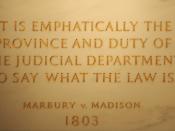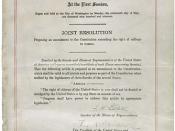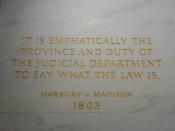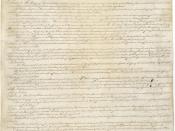Marbury v. Madison, 5 U. S. (1 Cranch) 137 (1803)1.FactsMarbury was appointed as a justice by former President John Adams in the end of AdamÃÂs term. However, new President Thomas Jefferson refused to deliver the late commission. Marbury then, on the basis of the Judiciary Act of 1789, asked the Supreme Court to issue a writ of mandamus obligating Madison, the Secretary of State, to deliver the commission.
2.HoldingsMarbury has a right to the commission, but Supreme Court canÃÂt afford him legal remedies, since the Judiciary Act of 1789 , on which he base his claim, is unconstitutional.
3. Reasoning1.Marbury has a right to the office. Because, (a)When former President signed the commissions, the appointment has already been made, conferring on Marbury a right to the office.(b)This kind of appointment is not revocable at the executiveÃÂs discretion.
2. Marbury should be afforded legal remedies. Because, (a)The essence of a legal right consists in a claim to legal protections when it is injured.(b)The
issue in question concerns whether Marbury has a legal right. It is not a political question which is only politically examinable.
3.The writ of mandamus is a proper remedy for Maidson, if this court can issue this kind of writ. Because, (a)The court which issues a writ of mandamus only requests the performance of a legal duty. And this doesnÃÂt constitute an intrusion on executive power.
4.The Superme Court canÃÂt issue the writ of mandamus according to the Constitution, however. Because,(a)The Article â ¢ of the Constitution only assignsappellate jurisdiction to the Supreme Court, except from ÃÂcases affecting ambassadors, other public ministers and consuls, and those in which a state shall be a party.ÃÂ(b)The Judiciary Act of 1789 which authorizes the Supreme Court to issue writs of mandamus in effect empowers the Supreme Court to exercise original jurisdiction in these cases. Yet this act is unconstitutional, since the Constitution already enumerates the distribution of jurisdiction among courts, implying the legislature has no power to redistribute it.
5.Laws conflicting with the constitution are void. Because, (a)One of the aims of a constitution is to limit governmental powers. And if unconstitutional laws are to be valid, then the constitution canÃÂt in effect limit legislative power, making its aim unattainable. (b)If unconstitutional laws are to be valid, then the constitution is like ordinary acts, all alterable at the will of the legislature. And this is contrary to the nature of a constitution : a fundamental law ÃÂunchangeable by ordinary meansÃÂ.
6.The Supreme Court has the power to nullify unconstitutional laws. Because, (a)The core of judicial power lies in interpreting laws, and deciding on the operation of conflicting laws.(b)To say that unconstitutional laws are void in theory and valid in practice, is simply inconsistent. (c)The Article â ¢ of the Constitution gives courts the judicial power in ÃÂall cases arising under the constitutionÃÂ. And it is impossible to decide those cases disregarding the Constitution, under which these cases arise.(d)Many other articles in the Constitution are meant to be basic rules not superseded by ordinary acts, implying that these are rules both for courts and the legislature.(e)Judges take an oath to perform their duties agreeably to the Constitution.
4.Reflection of the case1.Reflections on reasoning: (a) 6.(b) only entails that laws conflicting with the Constitution are void , but not that the Supreme Court has the very power to nullifythem. In fact, I think it collapses into the arguments given in 5 .
(b)The reasoning in 6.(d) is too quick. Articles which are meant to be basic rules not superseded by ordinary acts doesnÃÂt directly empower the Supreme Court to nullify unconstitutional laws. More supporting premises are needed. In fact, I think it only supports the conclusion in 5.
(c)As to the reasoning in 6.(e) , I donÃÂt think the particular ritual of an oath obligates judges to nullify unconstitutional laws. But, if we interpret the oath-taking as the receiving of authorized power, it can transform into a more theoretical and cogent argument from constitutional theory : It is because the courtsÃÂ judicial power is given by the Constitution, that they, in exercise of this power, should nullify unconstitutional laws in defense of the source from which this very power comes, that is, the Constitution.
2.Reflections on conclusion:(a)Some may object that for a court having no or little political legitimacy, to nullify an unconstitutional law enacted by the legislature, which has political legitimacy, is simply undemocratic.
But I think this seeming drawback of judicial review is exactly its merit. Modern constitutions often take democracy as one, but not the only one, of its founding principles ; howerver, minorities may be sacrificed, and other founding principles of a constitution, e. g. inviolable human rights, may be endangered all in the name of democracy. And judicial review offers a resort for minorities; moreover, it resolves the internal tension between democracy and other founding principles of constitution, all in the frame of the constitution. Therefore, the ÃÂundemocraticÃÂ objection to judicial review isnÃÂt that damaging after all.
Bibliography:Marbury v. Madison, 5 U. S. (1 Cranch) 137 (1803)





